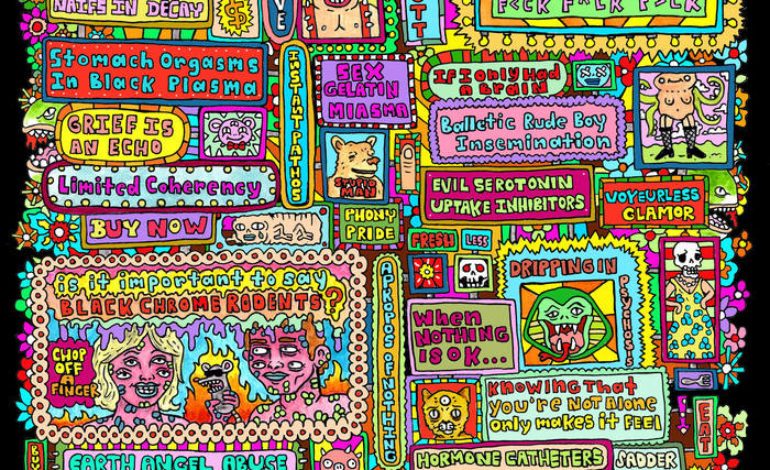
A new dimension of transcendence
Released on July 29th, 2022, of Montreal’s newest album Freewave Lucifer f<ck f^ck f>ck is packed with new wave electronica and existential lyrics. The album has musical and lyrical themes that take a deep dive hypnotically into the human psyche. Even before hitting play, the album cover itself also compliments the idea of hallucination with vibrant colors and artwork to match. Every spare inch of the album cover is screaming to be paid attention to, and this idea is carried on over in the music itself in each of the seven tracks.
Immediately starting with a bang, the first track, “Marijana’s A Working Woman,” leaves listeners hooked on the transcending story it tells. With the song sitting around five minutes in length, each minute is different than the last, with ever-evolving electronica instruments. Yet, the song still has an artistic direction and never feels like it is aimless with its musical composition—if anything just the opposite. In particular, the song features many moments of full-on chordal harmonies in the main vocal part that can add to the trippy experience that Montreal is going for.
The lyrics complement the harmonic structure as well. For example, in the first few minutes of the song the lyrics speak of living in a world with no direction and feeling completely adrift saying, “When people ask my gender I just tell them brunette.” Although humorous in the beginning, by the final minute the lyrics have changed to a more nihilistic note. The lyrics end with a final question, “How does it feel to be a bust?” This first impression is only the tip of the iceberg for what the album has to offer.
Following up strongly are the songs “Ofrenda-Flanger-Ego-à Gogo” and “Nightshift.” Both songs follow a similar formula of thematic hallucinogenics and nihilistic lyricism that appear in the first track. Each of the seven songs feel like they have a distinct purpose: divulging from each other, but not feeling out of place. Just as well, similar compositional techniques are used to overall success in both of these specific pieces. In “Ofrenda-Flanger-Ego-a Gogo” the piece has the verses spoken almost monotonously on one or two notes. The lyrics for the chorus however complement the “trippy psychosis,” as the song describes by breaking into harmonies that follow the chord structure of the melody notes, similar to the technique discussed in “Marijana’s A Working Woman.” These jumping from extremes in mere seconds back and forth with ease shows the true talent of the compositional team of the band. This leads to an interesting result of messing with the tonal center of the piece and is something that many artists do not experiment with, which is extremely impressive with its implementation.
Overall, the experiment that is Freewave Lucifer f<ck f^ck f>ck, by of Montreal is a resounding success. The electronica elements in the album are both chaotic yet thoughtful, and it is clear that the group has mastered the trippy elements to extenuate in their musical releases over the years. With almost three decades in the indie-pop genre, the Georgia-based band proves that it is still able to evolve with the times and create an astounding niche within the experimental genre.
